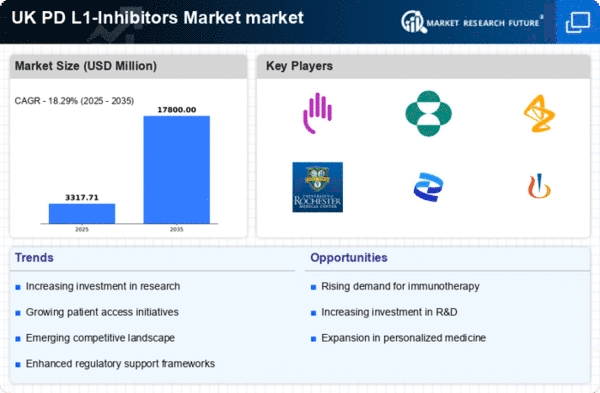Growing Incidence of Cancer
The rising incidence of various cancer types in the UK is a primary driver for the PD L1-Inhibitors Market. According to recent statistics, cancer cases are projected to increase by approximately 2.5% annually, leading to a heightened demand for innovative treatment options. This trend is particularly evident in lung cancer and melanoma, where pd l1-inhibitors have shown promising efficacy. As healthcare providers seek to improve patient outcomes, the adoption of these therapies is likely to expand. Furthermore, the increasing awareness of cancer screening and early detection is expected to contribute to the growth of the pd l1-inhibitors market, as more patients are diagnosed and treated with these advanced therapies.
Advancements in Immunotherapy
Recent advancements in immunotherapy have significantly influenced the PD L1-Inhibitors Market. The development of novel agents targeting the PD-1/PD-L1 pathway has opened new avenues for cancer treatment, enhancing the therapeutic landscape. In the UK, clinical trials have demonstrated that pd l1-inhibitors can lead to improved survival rates in patients with advanced cancers. The market is projected to grow at a CAGR of around 15% over the next five years, driven by the introduction of new products and combination therapies. As healthcare professionals increasingly recognize the potential of immunotherapy, the demand for pd l1-inhibitors is expected to rise, further solidifying their role in cancer management.
Rising Healthcare Expenditure
The increasing healthcare expenditure in the UK is a significant driver for the PD L1-Inhibitors Market. With the National Health Service (NHS) allocating more funds towards cancer treatment, there is a growing emphasis on providing patients with access to cutting-edge therapies. In recent years, healthcare spending has risen by approximately 4% annually, reflecting a commitment to improving cancer care. This financial support enables the procurement of pd l1-inhibitors, which are often more expensive than traditional therapies. As the healthcare system continues to prioritize innovative treatments, the pd l1-inhibitors market is likely to benefit from enhanced funding and resources, facilitating broader access for patients.
Patient Advocacy and Awareness
Patient advocacy groups in the UK are increasingly raising awareness about the benefits of PD L1-Inhibitors Market, which is driving market growth. These organizations play a vital role in educating patients and healthcare providers about the latest treatment options available. As awareness of immunotherapy expands, more patients are seeking information about pd l1-inhibitors as potential treatment alternatives. This heightened interest is likely to lead to increased demand for these therapies, as patients become more proactive in their treatment choices. Furthermore, advocacy efforts may influence healthcare policies, promoting the inclusion of pd l1-inhibitors in treatment guidelines, thereby enhancing their adoption in clinical settings.
Regulatory Support and Approvals
Regulatory support plays a crucial role in the growth of the PD L1-Inhibitors Market. The UK regulatory authorities have streamlined the approval process for innovative cancer therapies, facilitating quicker access to pd l1-inhibitors for patients. Recent approvals of several pd l1-inhibitors have bolstered confidence among healthcare providers and patients alike. This supportive regulatory environment is likely to encourage pharmaceutical companies to invest in the development of new therapies, thereby expanding the market. Additionally, initiatives aimed at expediting the review of breakthrough therapies may further enhance the availability of pd l1-inhibitors, contributing to their increased adoption in clinical practice.
















